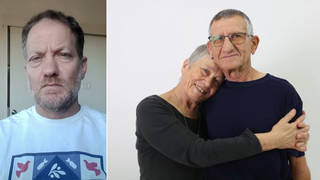
Guests
- Sara Jumping Eaglea pediatrician and a member of the Ogala Sioux Tribe.
In an extended interview with one of the first people arrested in the resistance movement against the Dakota Access pipeline, Dr. Sara Jumping Eagle explains, “as a physician, I’m very aware of what the health effects could be of a pipeline spill … among our communities.” Jumping Eagle is a pediatrician and a member of the Standing Rock Sioux Tribe.
Transcript
AMY GOODMAN: Well, on Sunday, while we were on the reservation, we spoke more with Dr. Sara Jumping Eagle about why she, as a pediatrician, opposes the $3.8 billion Dakota Access pipeline.
DR. SARA JUMPING EAGLE: Anpétu wasté. I’m Dr. Sara Jumping Eagle. [speaking in Lakota]
AMY GOODMAN: You were one of the first people arrested during these resistance movements against the Dakota Access pipeline. What—when was it, and why did you do it as a doctor here?
DR. SARA JUMPING EAGLE: You know, I’ve been involved with environmental health issues for a long time. Since we moved to North Dakota, we had been aware of the fracking and flaring going on in the Bakken, and I’ve been paying attention to water issues here and across the United States, as well. We’re—I’m Oglala Lakota and Mdewakantonwan Dakota, and so we also are aware of the issues going on in the Black Hills with uranium mining, the other contaminations that have occurred across Indian country. So, as a physician, I’m very aware of what the health effects could be of a pipeline spill by the Dakota Access and Enbridge, Energy Transfer Partners corporation, among our communities, how that spill would directly affect our family members and community members. I went to the protest site to participate in the protests. And on that day was when—
AMY GOODMAN: When was it?
DR. SARA JUMPING EAGLE: I believe it was August 12th. And so, there had already been some people arrested prior to that, trying to stop the machines from going onto the land just north of the Oceti Sakowin camps. That was actually before the camp had really started. But the Sacred Stone Camp had been there since April. So I went there just with the intent of participating as any citizen would concerned about our environment.
AMY GOODMAN: And what was happening on the site that day?
DR. SARA JUMPING EAGLE: At that time, there were already machines that were digging up the earth, and they were already setting—they had marked out a path all the way to the river. We didn’t know all of that at that time. And so there were people that were collected along the road that were praying, and they were singing and saying different, you know, protest chants, basically. And there were community members of all ages and all races there to help us, you know, voice our opposition to what was going on. But, you know, at the time we were there, it was very traumatizing to see that these machines were coming onto our treaty territory, which is just north of the Cannonball River, and really not listening to the voices of the people who will be affected if a—when a pipeline spill occurs.
AMY GOODMAN: Now, can you give us a little history, Dr. Sara? This pipeline was originally slated to be built above the city of Bismarck, but the cities of Bismarck and Mandan said no, so they moved lower to the reservation?
DR. SARA JUMPING EAGLE: That’s our understanding. You know, the decisions that are made regarding pipelines in North Dakota, those decisions have to go through the Public Service Commission. And so, we were first aware of the Dakota Access pipeline route in 2014, is when I became aware. And so, the company had notified the tribe of the route they were going to take, and, you know, there were probably about 50 of us community members that attended and voiced our opposition at that time to the route.
The tribe’s historian at that time informed the company of the really special and sacred place that that area is. It’s called Sacred Stone Camp and Sacred Stone for a reason. The confluence of the rivers right there had created many stones that were sacred to our community members, to our people, and had been used in spiritual ways for hundreds of years. And so, the fact that the company—and also, that area is a historical place, the Cannonball Ranch. There are other stories of when our people had to flee the Army and the cavalry of places that they would cross, and those are historic places, as well. And so we knew that the company was already planning on violating national—national laws that have to do with national historic preservation. The graves and the stone effigies that are in that area are also important to our community members.
AMY GOODMAN: Were you there on September 3rd?
DR. SARA JUMPING EAGLE: When the dog attacks occurred? I was there, but I had already been arrested previously, and so I was one of the people named in the SLAPP suit with a restraining order. So, I actually was there, but I had to stay a hundred feet away.
AMY GOODMAN: Explain what that SLAPP suit is.
DR. SARA JUMPING EAGLE: So, the SLAPP suit, basically, it named several people, including the tribal chairman and other tribal councilmen and several other people, but then they added on Jane and John Doe onto that. And initially, you know, those of us that weren’t initially named in that SLAPP suit weren’t aware of that until we were served, which weren’t properly served papers in the SLAPP suit, which basically said that there was a restraining order on us, that we could not engage in protest or be near any Dakota Access areas.
AMY GOODMAN: Because?
DR. SARA JUMPING EAGLE: Because we had already previously been arrested and identified. Like, the charge that I was charged with was disorderly conduct.
AMY GOODMAN: So, explain what you did that day, on August 12th.
DR. SARA JUMPING EAGLE: Well, I mean, I won’t, you know, say all the details, but basically I had gone there to participate in the protest. And when the company, the people who are part of the company were leaving the area, the machines were—machines and trucks were going north and south on Highway 1806. And they were—they were basically violating our treaty rights. And so, the actions that I was involved with that day were to protest the company using our treaty lands to facilitate building a pipeline, which threatens our way of life.
AMY GOODMAN: When you say your treaty lands, can you explain what they are? And are some of those lands the Army Corps of Engineers’?
DR. SARA JUMPING EAGLE: Yes, the Army Corps of Engineer lands are included in our treaty territory. When you look back at the 1851 and 1868 treaties, those lands—I believe it’s south of the Heart River—are part of the treaty territory. And that includes the lands that the Army Corps has claimed are their lands, as well. And so, that’s something that I think isn’t really fully understood by people in North Dakota or in the United States. Once the lands were flooded in the—I believe it was 1962, with the dams, that the Army Corps claimed all the land along the river.
AMY GOODMAN: That created Lake Oahe.
DR. SARA JUMPING EAGLE: Yes, that created Lake Oahe and Lake Sakakawea up on Three Affiliated territory.
AMY GOODMAN: What do you think will happen at this point with the pipeline? Do you think you’ll be able to stop it?
DR. SARA JUMPING EAGLE: I do think we’ll be able stop it, and especially with the support of our allies across the world. I mean, that’s something that’s given us a lot of hope, is that people are recognizing that this is not just a local issue, but it’s an international issue. We know that there are people around the world that are also fighting to keep their waters clean and fighting for the health of their families and community members. And that’s really what I want people to know, is that we’re average people. We’re doctors, teachers. We’re moms. I’m a mother and a wife. And we’re standing up because we don’t want the corporations to make these decisions for my children anymore. I want my children to have clean water. I don’t want to worry about how many hydrocarbons, how much fracking waste has been dumped into our river. And we have communities all across South Dakota that depend on this river also. So, those are the things that I think people are recognizing, and that’s why they’re standing with us and helping us.
AMY GOODMAN: I was speaking with a non-Native person who had come to the reservation casino to see a concert, and I asked him what he thought about the pipeline. And he said it’s the safest way to carry the oil, better than trucks. Your response?
DR. SARA JUMPING EAGLE: My response is that if we need infrastructure here in our communities—we do need infrastructure. And so, the safest way is for us to change to renewable energy. Right now we’re standing here being buffeted by winds that could be harnessing energy for our communities. And North Dakota should be in the lead of harnessing that wind energy. Yes, we are still using fossil fuels, and our hope is that we’ll gradually use less fossil fuels and use renewable energy, which we know is healthier for our people and for the planet.
AMY GOODMAN: As a doctor and a pediatrician, Dr. Sara, what are your concerns right now?
DR. SARA JUMPING EAGLE: My concerns are that we—I feel that we’re part of one of the biggest public health experiments in our lifetime. We really don’t know the long-term effects of fracking and of hydrocarbons on our bodies. We know that other scientists have identified some of these chemicals that are being put into the water as neuroendocrine receptor—that they interact with our neuroendocrine receptors, that could affect our DNA and our reproductive health. So those are my concerns, is: How is this affecting my daughter right now as she drinks—as she drinks this water?
AMY GOODMAN: And speaking of health, there’s been recent regulations changed around radioactive waste here in North Dakota. How does that relate? And can you explain what that is?
DR. SARA JUMPING EAGLE: How that relates is that the state of North Dakota and the Public Health Department and the Public Service Commission had recently voted to raise the level of radioactive waste in the state of North Dakota, the level that could be stored here. Prior to that, I believe the level was 10 microcuries, and now they’ve raised it to 30 microcuries. The companies, a lot of times, have been using subcontractors who were dumping radioactive waste just in random warehouses. And those are found—I mean, there are stories like that every year or two here in North Dakota. And, of course, they’re not front-page news in the local media.
So those are things that we have to be aware of and continuing to fight against the lack of regulation of these environmental waste products in North Dakota and the lack, really, of a public health discussion in our state, that have not been given a voice in the Public Service Commission process or really a voice in the media, either. And I really think they don’t want people to be aware of what’s happening, so that we won’t be afraid of what’s going into our bodies.
AMY GOODMAN: What’s the status of the SLAPP suit now?
DR. SARA JUMPING EAGLE: Right now those SLAPP suits had been dismissed. As far as—I know I’d recently received an offer in the mail from the prosecutors for a plea deal, as well. But I know that I’m not guilty of disorderly conduct, and so that’s—that’s my fight that I’ll continue. And so will many of the water protectors, as well.
AMY GOODMAN: Where do you live?
DR. SARA JUMPING EAGLE: I live in Fort Yates, North Dakota, and I’ve also been a part of the camp at the Oceti Sakowin Camp.
AMY GOODMAN: Is Fort Yates on the reservation?
DR. SARA JUMPING EAGLE: Yes, it’s just about 20 miles south of Cannon Ball.
AMY GOODMAN: Thank you.
DR. SARA JUMPING EAGLE: Yes. Then, one last thing is that I really want to call people to notice that the companies are really trying to commit environmental genocide on our people and that the fact that they deemed that the Bismarck—the city of Bismarck was not a safe place to put this pipeline, but they then decided to place it north of our communities, points out the fact that this is environmental genocide. It’s been attempted in several other communities, including my original community, is the Oglala Lakota Nation. We see a pattern of corporations doing this. And as people, we’re going to stand up against that, and we’re going to continue to fight for our health and our way of life.
AMY GOODMAN: The issue of fracking and radioactive waste, can you explain the connection?
DR. SARA JUMPING EAGLE: What happens when they are fracking and they’re pumping chemicals and using our water to squirt it down these holes that they create to then suck it back out, they suck it back through these fracking socks. And the fracking socks, over time, because they’re collecting so much sediment and minerals, some of that is the naturally occurring radioactive minerals in the ground, but it becomes concentrated in these fracking socks. So, the fact that we’re finding, you know, thousands of them in a warehouse that has not been monitored at all, and what—how is that affecting the groundwater underneath that, is very concerning.
AMY GOODMAN: That’s Dr. Sara Jumping Eagle, a pediatrician on the reservation, member of the Standing Rock Sioux Tribe. When we come back, we’ll continue to look at healthcare in Standing Rock, including healthcare at the resistance camps, where the first baby was just born. Stay with us.












Media Options